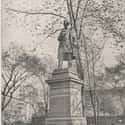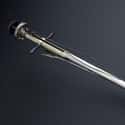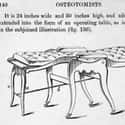-
(#1) He Was Long Held In Esteem For Inventing Much Of The Foundation For Modern Gynecology
For over a century, J. Marion Sims boasted a sterling reputation. Born in 1813 in South Carolina, Sims opened one of the first women's hospitals in history, invented the speculum, published the first textbook on gynecological surgery, and earned the title "Father of Modern Gynecology." Sims also served as president of the American Medical Association, was the personal doctor of an empress, and gave expert medical advice after President James A. Garfield was shot.
In the late 20th and early 21st centuries, though, medical professionals and historians began to question the ethics of Sims's experiments, which placed slave women under the knife without anesthesia, even after it was widely available.
-
(#2) In His Writing, Sims Documented The Pain He Caused His Slave Patients
While Sims has been memorialized with numerous statues, his descriptions of medical experiments on slave women, performed without anesthesia, are difficult to read. In his first surgical case, Sims operated on a young slave named Lucy. He wrote:
That was before the days of anesthetics, and the poor girl [Lucy], on her knees, bore the operation with great heroism and bravery. I had about a dozen doctors there to witness the series of experiments I expected to perform... At the end of five days [Lucy] was very ill. She had fever, frequent pulse, and real blood-poisoning, but we did not know what to call it at that day and time.
During the operation, Sims intentionally left a sponge in Lucy's bladder, but it became dangerously infected. Sims recalled, "Lucy's agony was extreme... I thought she was going to die."
-
(#3) Lucy, Betsey, and Anarcha, Sims's Three Recorded Slave Patients, Endured A Great Deal Of Pain Many Benefit From Today
Sims operated on many enslaved women, but we only know three of their names: Lucy, Anarcha, and Betsey. Records state that during an hourlong operation without anesthesia, 18-year-old Lucy screamed and cried out in pain. Sims first experimented with a speculum on Betsey, using the bent handle of a spoon to examine her.
And Anarcha was just 17 years old when Sims first operated on her; she underwent a total of 30 operations, all without painkillers, over a four-year period. Sims was also experimenting with closing surgical cuts after his procedures. It took 30 operations on Anarcha before he perfected the technique. For years, Sims gave heavy doses of opium to his patients after surgery, with the goal of inducing constipation while their stitches healed.
-
(#4) Sims Invented The Speculum Using A Bent Spoon On A Slave Patient Named Betsey
Sims invented the vaginal speculum, an important tool used by gynecologists to this day. He came up with the idea when a white patient visited Sims after falling off a horse, which caused a prolapsed uterus. After repairing the problem, Sims decided to take a closer look at one of his patients, a slave named Betsey.
Sims realized that by using the bent handle of a pewter spoon, he could better diagnose Betsey's medical problem. Sims later wrote that he told his patient, "'Betsey, I told you that I would send you home this afternoon, but before you go I want to make one more examination of your case.' She willingly consented." Using the spoon, Sims diagnosed Betsey with a fistula. He also reported, "I saw everything, as no man had ever seen before."
-
(#5) For A Long Time, The Medical Profession Praised Sims, Even While Acknowledging The Issues With His Work
For decades, the medical profession praised Sims for his groundbreaking research, even while acknowledging the ethical problems with the way he conducted that research. As Dr. Tatiana M. Gellein found in her research, the first critiques of Sims's work did not emerge until the civil rights movement.
Even in 1978, the American Journal of Obstetrics & Gynecology published an article that concluded, "[Sims's] original three subjects might never have tolerated the pain and misery of the repeated operations had they not been slaves. In the long run, they had reason to be grateful to Sims."
-
(#6) At The Heart Of The Issue Is Sims Using Anesthesia On White Patients While Denying It To Black Patients
The Sims debate often comes down to the anesthesia question. Was Sims wrongfully denying anesthesia to women undergoing surgical procedures, which would be tantamount to torture? Or was he simply skeptical of a new medical tool that was still not in widespread use?
Sims's defenders point out that the first successful use of anesthesia in surgery only occurred in 1846 - the year after Sims began experimenting on Black women. The practice was not widespread in the 1840s, and some doctors preferred operating on awake patients. However, Sims's critics point out that when the doctor expanded his perfected surgical techniques to white patients, he gave them anesthesia. Some suggest Sims decided not to use anesthesia when experimenting on Black women because he subscribed to the racist and incorrect view that Black people didn't feel pain as strongly as white people.
-
(#7) Defenders Claim Sims's Advances Were Worth The Ethical Problems
Was Sims simply a man of his time? As Sarah Zhang wrote for The Atlantic, "To implicate [Sims], his defenders implied, is to implicate medicine in mid-19th century America." It was common practice not to use anesthesia, after all, and medical ethics was barely in its infancy.
Sims's more virulent defenders claim the medical advances he pioneered justify his ethical violations. Some even suggest Sims's patients, slave women with fistulas, would have consented to the experiments to cure their medical problems, even if their consent was not legally required at the time. However, the logic underlying such a suggestion - that we can look backward and know what individuals would have said or done had their circumstances been different, without explicit statements from those individuals - is inherently fallacious.
-
(#8) Though Sims Wrote That His Patients Consented, The Notion Of Consent Didn't Apply To Slaves
According to Sims, his patients "clamored" for his treatments. He described asking one young slave woman, Betsey, if he could examine her, and reported that "she willingly consented."
Of course, at the time, slaves had no power to withhold consent - if their owner wanted them to undergo surgery, the slave could not refuse. Scholar Bettina Judd notes that consent is not simply "whether you can say yes; it's also whether you can say no." Even if we trust Sims's account, the women he cut open without anesthesia were not legally able to consent or withhold their consent, complicating the defense that Sims only operated on willing patients.
-
(#9) We Have No Record Of How The Enslaved Women Felt About The Experiments, Only Sims's Writing
In 2012 the Annals of Surgery journal defended Sims's experiments, after first acknowledging the controversy: "Some writers have criticized the ethicality and morality of his clinical practice because it involved the enslaved and indentured." After this acknowledgment, the article dismissed the problem of patient consent, arguing that "relief of pain was the major concern for both master and bondsman," a statement that ignores brutal methods of controlling slaves and the sexual assault of slave women by their masters.
The medical article repeated Sims's claim that his patients were willing to undergo his experiments. "Ladies, both free and enslaved, who suffered from that calamity, desired the opportunity to be healed. Dr. Sims stated, 'My patients are all perfectly satisfied with what I am doing for them.'" Sims may have claimed his patients consented, but we have no records from the women he operated on - including 30 surgical operations on Anarcha without anesthesia.
-
(#10) Sims Also Experimented On Slave Children Based On The Dominant Racist Beliefs Of His Era
In addition to his surgical experiments on Black women, Sims also tested his methods on enslaved Black children. But his attempts to cure neonatal tetanus were unsuccessful. As part of his experimental treatments, Sims used shoemaker's tools to "loosen" the bones in Black children's skulls, based on the belief that Black people were less intelligent than white people because their skulls were too tight.
While Sims may have pioneered important medical techniques, he did so by abusing Black bodies with the conviction that they were inferior to white patients. However, his views were within the mainstream for 19th-century medical science.
-
(#11) Placing Sims In Context Means Rethinking Monuments Honoring Him
Some argue Sims has to be understood as a man of his time, but his legacy is also part of a long, troubling one of abusing Black people as medical test subjects. By operating on Black women without their consent, Sims placed himself in the company of the Tuskegee syphilis experiment. And as with other complicated figures, we can both recognize Sims's medical advances while honoring the women who had an important role in those experiments.
In April 2018 New York City removed a Central Park statue honoring J. Marion Sims. Manhattan's Deputy Borough President Matthew S. Washington concluded, "To hail Sims as a hero was inappropriate and out of bounds." Instead, the statue will be relocated to the cemetery where Sims is buried, where a sign will put Sims's work in context.
New Random Displays Display All By Ranking
About This Tool
One of the most controversial historical figures includes the "father of gynecology"-James Marion Sims. His efforts and contributions have made gynecology an indispensable part of medicine. He invented the speculum, successfully cured the vesicovaginal fistula, and founded the first women's hospital in New York. But for the sake of medical achievement, he used 11 black slaves in experiments for 5 years, and one of the female patients even went through as many as 30 operations.
He is a great doctor, but at the same time a cruel racist, caused a large number of black women to suffer painful operations without anesthesia. The random tool introduced 11 complicated historical stories about James Marion Sims.
Our data comes from Ranker, If you want to participate in the ranking of items displayed on this page, please click here.





















